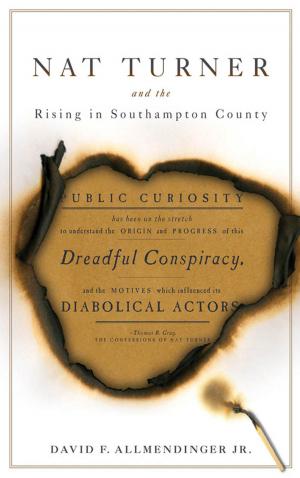The Fate of the Revolution
Virginians Debate the Constitution
Nonfiction, History, Americas, United States, Social & Cultural Studies, Political Science| Author: | Lorri Glover | ISBN: | 9781421420035 |
| Publisher: | Johns Hopkins University Press | Publication: | June 15, 2016 |
| Imprint: | Language: | English |
| Author: | Lorri Glover |
| ISBN: | 9781421420035 |
| Publisher: | Johns Hopkins University Press |
| Publication: | June 15, 2016 |
| Imprint: | |
| Language: | English |
In May 1788, the roads into Richmond overflowed with horses and stagecoaches. From every county, specially elected representatives made their way to the capital city for the Virginia Ratification Convention. Together, these delegates—zealous advocates selected by Virginia’s deadlocked citizens—would decide to accept or reject the highly controversial United States Constitution, thus determining the fate of the American Republic. The rest of the country kept an anxious vigil, keenly aware that without the endorsement of Virginia—its largest and most populous state—the Constitution was doomed.
In The Fate of the Revolution, Lorri Glover explains why Virginia’s wrangling over ratification led to such heated political debate. Beginning in 1787, when they first learned about the radical new government design, Virginians had argued about the proposed Constitution’s meaning and merits. The convention delegates, who numbered among the most respected and experienced patriots in Revolutionary America, were roughly split in their opinions. Patrick Henry, for example, the greatest orator of the age, opposed James Madison, the intellectual force behind the Constitution. The two sides were so evenly matched that in the last days of the convention, the savviest political observers still could not confidently predict the outcome.
Mining an incredible wealth of sources, including letters, pamphlets, newspaper articles, and transcripts, Glover brings these remarkable political discussions to life. She raises the provocative, momentous constitutional questions that consumed Virginians, echoed across American history, and still resonate today. This engaging book harnesses the uncertainty and excitement of the Constitutional debates to show readers the clear departure the Constitution marked, the powerful reasons people had to view it warily, and the persuasive claims that Madison and his allies finally made with success.
In May 1788, the roads into Richmond overflowed with horses and stagecoaches. From every county, specially elected representatives made their way to the capital city for the Virginia Ratification Convention. Together, these delegates—zealous advocates selected by Virginia’s deadlocked citizens—would decide to accept or reject the highly controversial United States Constitution, thus determining the fate of the American Republic. The rest of the country kept an anxious vigil, keenly aware that without the endorsement of Virginia—its largest and most populous state—the Constitution was doomed.
In The Fate of the Revolution, Lorri Glover explains why Virginia’s wrangling over ratification led to such heated political debate. Beginning in 1787, when they first learned about the radical new government design, Virginians had argued about the proposed Constitution’s meaning and merits. The convention delegates, who numbered among the most respected and experienced patriots in Revolutionary America, were roughly split in their opinions. Patrick Henry, for example, the greatest orator of the age, opposed James Madison, the intellectual force behind the Constitution. The two sides were so evenly matched that in the last days of the convention, the savviest political observers still could not confidently predict the outcome.
Mining an incredible wealth of sources, including letters, pamphlets, newspaper articles, and transcripts, Glover brings these remarkable political discussions to life. She raises the provocative, momentous constitutional questions that consumed Virginians, echoed across American history, and still resonate today. This engaging book harnesses the uncertainty and excitement of the Constitutional debates to show readers the clear departure the Constitution marked, the powerful reasons people had to view it warily, and the persuasive claims that Madison and his allies finally made with success.















